Proper Disposal of Face Masks

Face masks have become essential in this era of public health emergencies.
While they are critical in preventing the spread of diseases, how we dispose of them can significantly affect the environment.
This guide will show you how to correctly dispose of different types of face masks and discuss eco-friendly alternatives.
Impact of Improper Disposal of Face Masks
Improper disposal of face masks leads to littering our streets and oceans and poses a threat to wildlife.
Moreover, used face masks can be a health hazard as they may contain harmful microbes. Proper disposal is, therefore, necessary to mitigate these risks.
Before buying face masks, it’s important to consider the alternatives and assess risk.
Instructions for Disposing of Different Types of Face Masks
Different types of masks require specific disposal methods:
- Disposable face masks: After use, fold the mask in half so the contaminated outside surface is inward, then put it in a covered waste bin.
- Reusable face masks: If a reusable mask is no longer usable, consider recycling programs for textiles in your local area.
Promoting Sustainable Alternatives
Disposable face masks, while convenient, generate a significant amount of waste. An eco-friendly alternative is using reusable masks or respirators.
Reusable respirators, for instance, can provide a high level of protection and can be cleaned and reused multiple times, reducing waste. Respirator wipes are ideal for cleaning them, offering a quick and easy way to disinfect your mask between uses.
Switching to reusable options can significantly reduce the environmental impact.
FAQs on Face Mask Disposal
Is it safe to dispose of face masks in the recycling bin?
No, used face masks cannot be recycled through regular recycling facilities. They should be placed in regular trash bins.
Can face masks be composted?
Most masks contain plastics and should not be composted. Even masks designed to be made of the right material generally are only compostable in industrial waste management centers. Don’t throw face masks into your backyard compost bin.
How often should I change my face mask?
Disposable face masks should be changed whenever they become damp or after a day’s use, whichever comes first. Washable face masks should be washed when soiled. Reusable respirators should be wiped after each use.
Conclusion
Each of us has a part to play in reducing the environmental impact of face masks.
Proper disposal is critical, but buying reusable respirators can be even more beneficial.
By embracing these practices, we can contribute to public health and the health of our planet.
